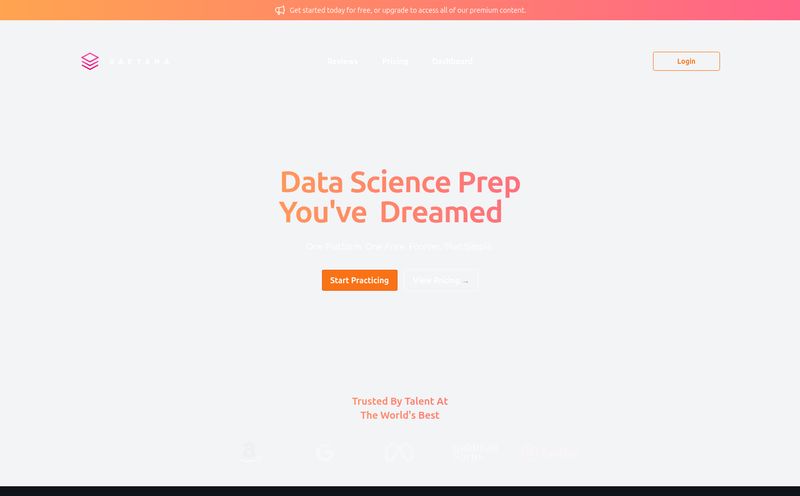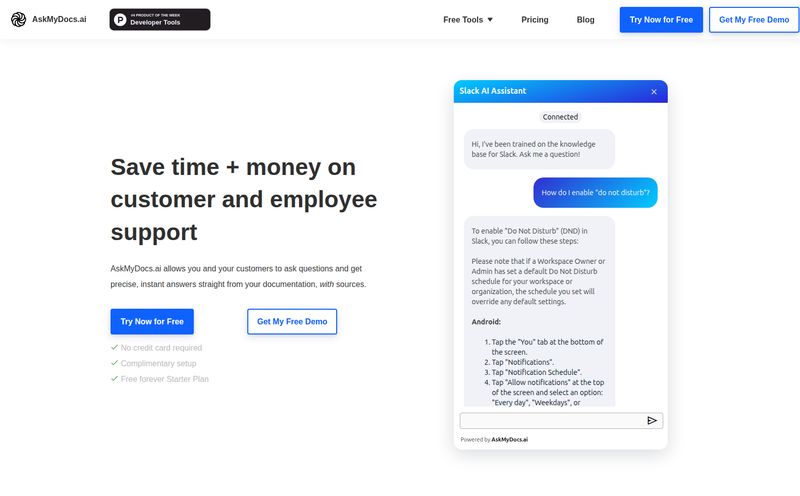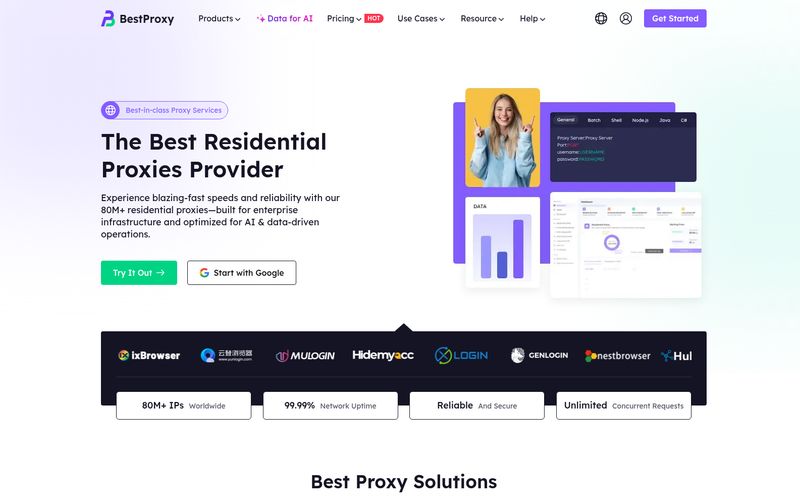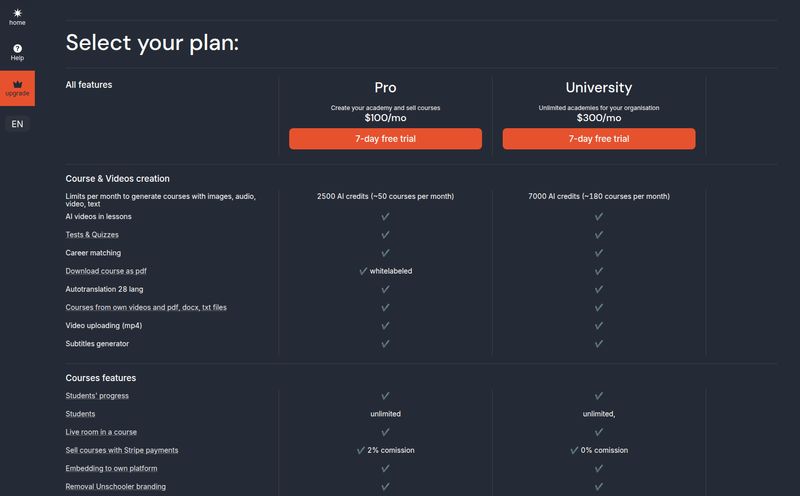You know the feeling. You get that email notification: “Your lab results are available.” A weird mix of dread and anticipation hits you. You log into the patient portal, download the PDF, and are immediately confronted with a wall of acronyms, numbers, and those scary 'HIGH' or 'LOW' flags. My glucose is 102? What does MCHC even mean? And just like that, you’re tumbling down the Dr. Google rabbit hole, diagnosing yourself with three different fatal diseases in under ten minutes.
It’s a universally terrible experience. For years, we've needed a translator. A simple tool to bridge the gap between dense medical data and actionable human understanding. So when I started hearing about AI-powered blood test analysis platforms, my interest was definitely piqued. A tool that promises to turn those cryptic reports into plain English in seconds? Sign me up.
One such tool that popped onto my radar was pitched as an 'AI Blood Test Analysis' platform, promising instant, secure insights. The idea was brilliant. But as is often the case in the wild west of tech startups, ideas and reality can be two very different things.
The Strange Case of the Vanishing Health App
So, I set out to review this specific platform. Its promises were exactly what the doctor ordered (pun intended). It claimed to be trusted by healthcare professionals, offered visual health metrics, and talked a big game about “enterprise-grade encryption.” All the right buzzwords.
I navigated to its listed domain, blood-test.io, ready to upload a test report and see the magic happen. And I was met with... this.
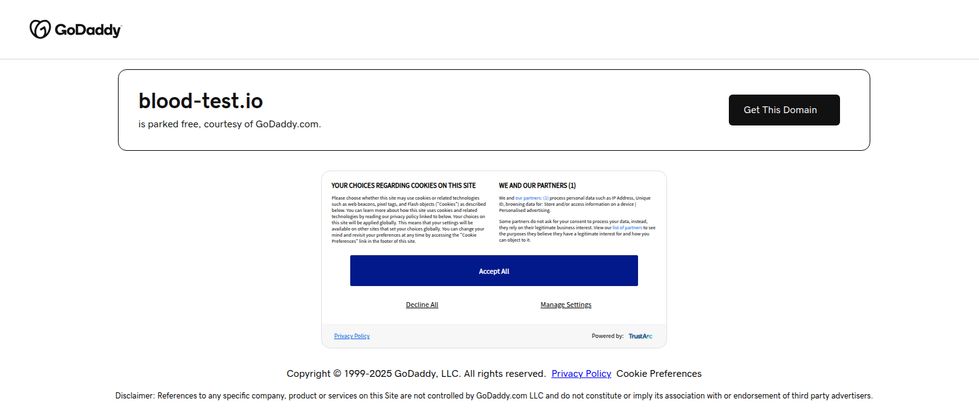
Visit AI Blood Test Analysis
A GoDaddy parked domain page. The digital equivalent of a “Sorry, We’re Closed” sign hanging on a dusty storefront. The tool, for all its potential, was gone. A digital ghost.
Now, I could have just scrapped this article. But honestly, this is a more interesting story. It’s a perfect, real-world snapshot of the health tech landscape: full of incredible promise, but also volatile and sometimes fleeting. So let's talk about the concept and the dream that tools like this one were selling, because it's a dream that is still very much alive.
The Big Promise: Your Personal Health Decoder
Let's not let one parked domain sour the whole idea. The potential for a good AI blood test analysis tool is massive. I’ve seen enough of them to know what they strive for, and when they work, it's pretty impressive.
Finally Understanding the Jargon
At its core, the biggest advantage is clarity. These platforms are designed to translate medicalese. Instead of just seeing “Hemoglobin A1c: 6.1% (HIGH),” a good AI tool might explain, “Your A1c is slightly elevated, which is an indicator of your average blood sugar over the last 3 months. This can be a pre-diabetic sign. We suggest discussing this with your doctor and considering reducing your intake of refined carbs.” See the difference? One is a data point. The other is a conversation starter.
Putting You in the Driver’s Seat
This kind of insight is genuinely empowering. For too long, many of us have felt like passive passengers in our own healthcare. We get tests done, we're told things are “fine” or “a little high,” and we nod along. When you can understand the ‘why’ behind the numbers, you can have a much more productive conversation with your doctor. You can ask smarter questions. “I saw my inflammation markers were up, could my diet be contributing to that?” is a world away from “So... am I okay?”
Let’s Be Real: The Hurdles and Headaches
Okay, time for a dose of reality. As an SEO and tech guy, I’ve learned to be a healthy skeptic. The promise is shiny, but the execution is fraught with challenges. And when it comes to your personal health data, the stakes are incredibly high.
The Data Privacy Question Mark
The first and most obvious concern is privacy. You’re being asked to upload one of your most sensitive documents to a third-party server. They can say “enterprise-grade encryption” and “HIPAA compliant” all day long, but data breaches happen to the biggest companies in the world. You have to ask yourself if the convenience is worth the risk. It’s a personal calculation, and there's no right answer. I've always been a bit paranoid about this stuff, and the idea of my full health history floating around the cloud gives me pause.
Accuracy Is Everything, and It’s Not Guaranteed
These AIs are only as good as the data they’re fed. The accuracy hinges entirely on the quality of the report you upload. Is it a clean, text-based PDF from Quest Diagnostics? You'll probably get good results. Is it a slightly blurry photo of a printed report from a small, local lab with weird formatting? All bets are off. This is the classic “garbage in, garbage out” problem, and a misinterpretation of health data is a lot more serious than a mistranslated meme.
This AI Is Not Your Doctor. I Repeat. Not. Your. Doctor.
This is the most important point, and I’ll put it in bold for a reason. These tools are for educational purposes only. They are a supplement to, not a replacement for, a qualified medical professional. An AI can spot a number that’s out of range, but it can’t understand your full context. It doesn't know your family history, your lifestyle, your other symptoms, or the hundred other nuances a human doctor considers. Use it to get smarter, not to self-diagnose.
So, Where Do You Go From Here?
Even with the mysterious disappearance of blood-test.io, the field is moving forward. There are other players out there, like InsideTracker or SelfDecode, which offer similar (and often more in-depth) services, though usually at a premium price. The concept is proving to have legs.
The pricing for the tool I was investigating remains a mystery, given its current state. Typically, services like this either charge a one-time fee per report analysis (maybe $10-$30) or a more expensive subscription model for ongoing tracking and deeper insights, which can run into hundreds of dollars per year. It's a new market and the pricing models are still shaking out.
Frequently Asked Questions
- Is it safe to use an AI for blood test analysis?
- It can be, but you have to be careful. Look for platforms that are transparent about their security and privacy policies. Understand that uploading any sensitive data online carries some inherent risk. Always weigh the benefit against that risk.
- Can an AI tool replace my doctor for interpreting results?
- Absolutely not. Think of it as a powerful educational tool or a co-pilot. It helps you understand the data so you can have a better, more informed discussion with your actual doctor. It cannot provide a diagnosis or medical advice.
- How accurate is AI blood test analysis?
- Accuracy varies. It depends on the sophistication of the AI and the quality of the report you provide. For standard markers from major labs, it can be quite accurate. For less common tests or poorly formatted reports, the accuracy can decrease significantly.
- What happens to my data after I upload it?
- This is a critical question to ask of any service. A reputable company should clearly state how they store, use, and protect your data in their privacy policy. Some may use anonymized data for research. If their policy is vague, I'd be very cautious.
- Why would a promising tool like blood-test.io just disappear?
- This happens all the time in the tech world. The company could have run out of funding, been acquired by a larger company that then shut down the product ('acqui-hired'), or faced legal or regulatory hurdles. Its a tough business.
My Final Take on AI Health Tech
I’m still optimistic. The thought of making health information accessible and understandable for everyone is a powerful one. AI Blood Test Analysis is a step in that direction. But as we’ve seen, it’s a rocky path. For every successful platform, there are digital ghosts like blood-test.io that serve as a reminder of the challenges.
My advice? Be curious but cautious. Use these tools to learn and to empower yourself. But never, ever let them replace the conversation with a real, human doctor who knows you. The best tech, after all, is the kind that enhances human connection and expertise, not the kind that tries to replace it.
Reference and Sources
- InsideTracker: A personalized health analysis and data-driven wellness guide.
- SelfDecode: An AI-powered platform for DNA and lab test analysis.
- GoDaddy: Domain registrar where the subject domain is currently parked.
